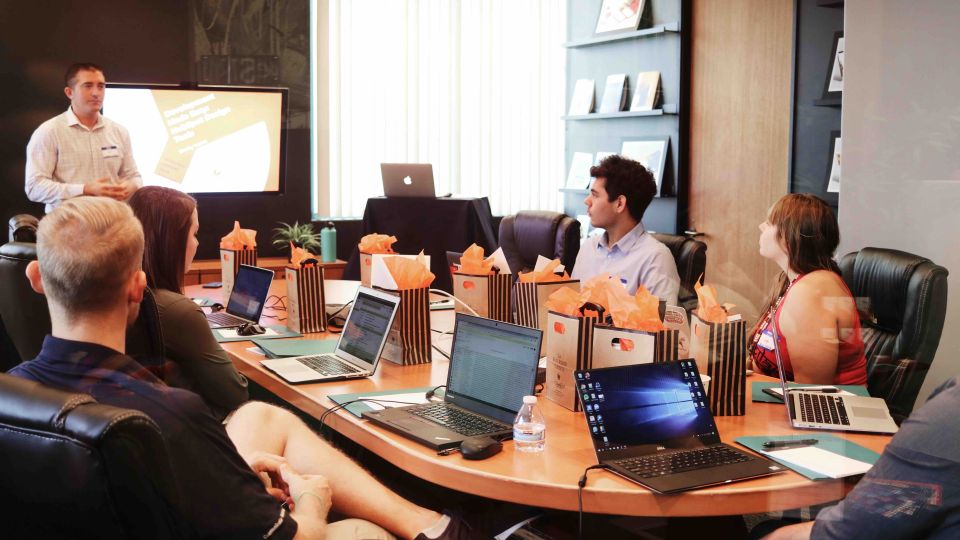

Exploring the Various Types of Personal Development
In a world where demands constantly shift and expectations continue to rise, personal development has become one of the most vital aspects of achieving both personal fulfilment and professional success. It’s no longer something you do on the side, it’s something you intentionally prioritise, no matter where you are in your career or life.
Personal development is about taking ownership of your growth. It’s about investing in your ability to lead, adapt, communicate, and thrive; whether that’s in your role at work, your relationships at home, or your interactions in the broader world. From enhancing communication skills and building emotional intelligence, to managing your time better and recovering from setbacks with resilience, it all forms part of a broader development journey.
At Macildowie, we recognise that growth isn’t one-size-fits-all. That’s why we offer a wide range of development programmes, coaching sessions, and career resources tailored to support your ambitions. We work with you to understand your goals, unlock your potential, and help you become the most effective version of yourself, both at work and in life.
Understanding Personal Development
What is Personal Development?
Personal development refers to a continuous, deliberate process where individuals improve their knowledge, skills, habits, and personal qualities to better navigate life and work. It’s the intentional effort to become more self-aware, emotionally intelligent, capable, and aligned with your goals and values.
It encompasses a wide spectrum of activities, professional skill-building, emotional regulation, mindset shifts, behavioural changes, and wellness habits, all aimed at helping individuals function at their best.
Importantly, personal development isn’t a quick fix. It’s a dynamic, lifelong pursuit. As you grow and evolve, your goals, values, and challenges will shift too. This requires constant reflection, adaptability, and commitment to learning.
Benefits of Personal Development
The benefits of personal development reach far beyond what’s visible on a CV. On a deeper level, it promotes self-acceptance, boosts confidence, and enhances decision-making by grounding you in self-awareness.
In practical terms, those who actively pursue personal growth are often more resilient in the face of adversity, more adaptable in new environments, and more likely to be recognised for leadership roles. They’re also more focused, energised, and motivated, factors that directly improve both productivity and job satisfaction.
Why Personal Development Matters
Professional Growth
For anyone wanting to future-proof their career, personal development is essential. It equips you with transferable skills, like adaptability, critical thinking, and leadership, that remain relevant regardless of industry shifts. Developing these capabilities increases your chances of promotion, enables better team collaboration, and enhances your value to current or prospective employers.
Personal Fulfilment
Beyond your career, personal development fosters a more balanced and meaningful life. It empowers you to pursue what truly matters, manage stress with greater ease, and build stronger personal relationships. You gain clarity on your values, a greater sense of purpose, and the tools to navigate both everyday challenges and major life changes.
Key Types of Personal Development
1. Skill-Building and Professional Growth
The modern workplace is evolving quickly, and keeping your skills up to date is key to staying relevant and competitive. This includes not just technical abilities tied to your role, but also the core interpersonal skills that enable effective collaboration and leadership.
Technical Skills: These are the industry-specific capabilities that allow you to perform your job. They can include anything from financial analysis and programming to copywriting or using CRM tools. Regular upskilling through online courses, certifications, or in-house training ensures you remain an asset to any employer.
Soft Skills: Skills like communication, active listening, collaboration, and conflict resolution are just as critical. Strong soft skills help you build trust, inspire teams, and navigate complexity.
Macildowie’s Contribution: We deliver tailored training and workshops that target both technical expertise and soft skill development. From upskilling initiatives for individuals to organisation-wide development programmes, we help professionals reach higher levels of performance.
2. Self-Awareness and Emotional Intelligence
Self-awareness is the bedrock of all personal growth. Without it, it’s difficult to improve in any meaningful or sustainable way.
Self-Awareness: This involves being deeply familiar with your thoughts, emotions, motivations, and habits. It’s about understanding how you show up at work and in your personal life, and recognising the impact you have on others.
Emotional Intelligence (EQ): EQ takes self-awareness further by adding in emotional self-regulation, empathy, and social skills. Those with high EQ build better relationships, navigate stressful situations with grace, and lead teams more effectively.
Practical Tips: To develop these qualities, use techniques like journaling to track emotional responses, mindfulness to centre your focus, and regular 360-degree feedback to gain external insights.
3. Goal-Setting and Motivation
Having goals is one thing; knowing how to achieve them consistently is another.
SMART Goals: A reliable structure for goal-setting, SMART (Specific, Measurable, Achievable, Relevant, Time-bound) goals help convert ambitions into tangible, trackable action. They encourage clarity and eliminate ambiguity.
Staying Motivated: Motivation isn’t a fixed trait; it fluctuates. That’s why it’s important to build systems that support consistency. Create vision boards, break goals into milestones, and use tools like habit trackers to stay accountable.
Macildowie’s Support: We guide individuals through structured goal-setting exercises, align career goals with role development plans, and provide accountability check-ins through coaching.
4. Resilience and Adaptability
In today’s unpredictable world, resilience and adaptability are vital for long-term success.
Building Resilience: Resilience is your capacity to bounce back from failure or stress. It involves emotional strength, realistic optimism, and the ability to stay grounded during periods of change.
Adaptability: Being adaptable means shifting mindsets, behaviours, and strategies when needed. It’s a key leadership skill that helps people and organisations stay competitive and responsive.
Strategies: Build resilience through gratitude practices, maintaining a strong support network, and reframing setbacks as learning experiences. Use techniques like breathing exercises, cognitive behavioural strategies, and structured reflection to build inner strength.
5. Time Management and Productivity
How you manage your time affects everything else in your development journey.
Prioritisation: Effective prioritisation means knowing what to work on and what to let go of. Tools like the Eisenhower Matrix or the Pareto Principle (80/20 rule) help identify high-impact tasks.
Efficiency: Boost productivity by using task batching, time-blocking, and the Pomodoro technique. Avoid multitasking; instead, build deep focus habits by working in distraction-free environments.
Macildowie’s Resources: Our productivity workshops equip professionals with time management skills tailored to their roles, industries, and personality types - helping them feel less overwhelmed and more in control.
Implementing Personal Development Strategies
Creating a Personal Development Plan
A structured personal development plan acts as your blueprint for growth. It brings clarity to your aspirations, provides direction, and helps you maintain momentum, especially when motivation dips. Begin by conducting a comprehensive self-assessment. Reflect on your strengths and achievements, areas that require development, and where you ultimately want to be in one, three, or five years.
Once you’ve identified these areas, establish specific goals. Break each goal into measurable, manageable steps. Assign realistic timelines to each step and track your progress consistently. Consider using development frameworks such as the GROW model (Goal, Reality, Options, Will) alongside SWOT analysis to keep your plan well-rounded.
Your plan should evolve with you. Revisit and refine it regularly, quarterly reviews can help maintain relevance and responsiveness to change. Think of it as a dynamic tool, not a static document.
Seeking Feedback
Constructive feedback accelerates development by helping you see yourself through the eyes of others. It provides clarity around how your behaviours, communication style, and work habits impact your team, stakeholders, or clients.
To maximise value, seek feedback frequently and intentionally. Approach peers, mentors, and managers with focused questions such as, “What would help me be more effective in group settings?” or “Where do you see growth potential I might not notice?”
It’s equally important to receive feedback openly and without defensiveness. Treat it as a learning opportunity. Reflect on it, identify recurring themes, and turn it into specific action points. By acting on feedback visibly, you not only enhance your performance but also build credibility and trust.
Continuous Learning
Lifelong learning is the fuel for continuous growth. It goes beyond formal education to include any activity that expands your knowledge, skills, or perspectives. Embrace both structured opportunities, like online courses, professional qualifications, or coaching sessions, and informal ones, such as books, podcasts, webinars, and industry events.
Cross-disciplinary learning often produces the richest insights. A project manager studying psychology, or a marketer exploring design thinking, brings a broader skill set and more innovative thinking to their role. Make learning habitual by allocating weekly time to it and tracking new skills or concepts acquired.
Finally, be intentional about how you apply what you learn. Implementing new insights into your daily routines, leadership approach, or communication style is what turns knowledge into impact.
Macildowie’s Role in Personal Development
Tailored Programmes: We create bespoke development solutions that reflect each individual's unique context. Whether you're navigating your first leadership role, re-entering the workforce, or managing a team through change, we meet you where you are. Each programme is designed around your strengths, challenges, aspirations, and work environment, ensuring relevance and impact. Our approach includes one-on-one coaching, behavioural profiling, and structured goal setting, providing you with a clear roadmap and the right level of challenge.
Workshops and Seminars: Our online and in-person sessions go far beyond the theoretical. We create practical, interactive experiences that give you real tools to use straight away. Topics include developing high-performing teams, cultivating resilience under pressure, navigating difficult conversations, leading through uncertainty, and boosting personal productivity. Each workshop is informed by current research, market insights, and feedback from past participants to ensure it hits the mark.
Success Stories: We've supported professionals from all walks of life; from newly promoted team leaders looking to build confidence, to senior executives preparing for board-level responsibilities. One client transitioned from a stagnant role into a strategic leadership position within six months of coaching. Another built a personal development plan that helped her step into a new sector with confidence. Time and again, we see how the right support at the right time turns uncertainty into clarity and ambition into action.
Conclusion
Personal development is more than a checklist of skills, it’s an ongoing commitment to becoming a more intentional, capable, and fulfilled individual. It demands self-awareness, reflection, and the courage to push through comfort zones. As you grow in your understanding of yourself and others, you build the foundation for stronger relationships, better decisions, and greater confidence in every aspect of life.
Your journey is entirely your own. Whether you're seeking clarity after a career transition, learning to manage stress more effectively, or aiming to become a more influential leader, the key is to take the first step, and keep going. Consistency, curiosity, and support make all the difference.
At Macildowie, we believe in empowering people to lead themselves before they lead others. Through our development programmes, expert coaching, and practical workshops, we help you turn self-improvement into a sustainable, lifelong habit. Because when you invest in yourself, you invest in your future, and in everyone you influence along the way.
Frequently Asked Questions
SMART goal-setting, structured feedback, continuous learning, and emotional self-regulation are among the most effective ways to develop personally and professionally.
Reflect on what you want to achieve and why. From there, set clear goals, identify learning opportunities, and build a simple action plan you can commit to.
We offer development workshops, coaching programmes, online learning content, and personalised plans that focus on real, sustainable progress.
Personal development improves leadership ability, decision-making, and adaptability, qualities that make you stand out in performance reviews, promotions, and interviews.
Absolutely. By building time management skills, emotional intelligence, and setting clear boundaries, you can achieve more balance and avoid feeling overwhelmed.









